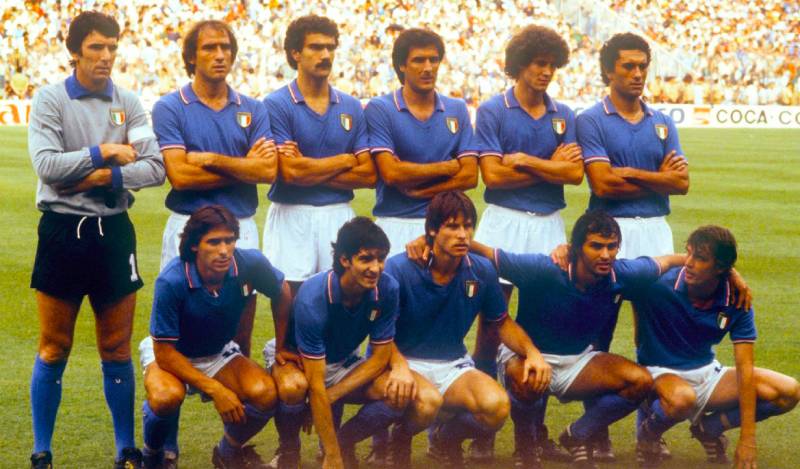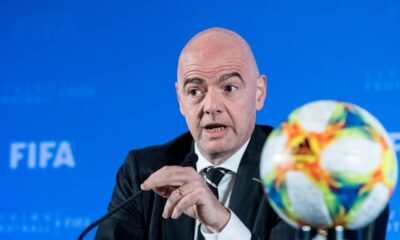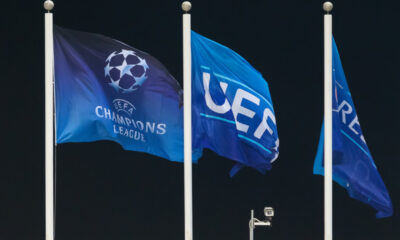Football
1982 World Championships in Spain: gold for Italy, big changes and records, disappointment for Czechoslovakia
Spain hosted the 12th World Championships in 14 cities. As well as breaking big records, the tournament also featured some other bizarre highlights and a truly horrific foul by German goalkeeper Harald Schumacher. In addition, FIFA completely redesigned the structure of the championship for the 1982 World Cup in Spain, with the Italians taking the gold.

Spain hosted the twelfth World Championships in 14 cities. As well as breaking big records, the tournament also featured some other bizarre highlights and a truly horrific foul by German goalkeeper Harald Schumacher. In addition, FIFA completely redesigned the structure of the championship for the 1982 World Cup in Spain, with the Italians taking the gold.
Spain hosted the 1982 World Cup in 14 cities. Specifically, Vigo, A Coruña, Gijón, Oviedo, Barcelona, Elche, Alicante, Bilbao, Valladolid, Valencia, Zaragoza, Seville, Málaga and, of course, Madrid.
The qualification for the 1982 World Cup in Spain involved 109 countries, with twenty-four countries taking part in the final tournament (fourteen European, six American, two African and one Asian, plus one representative from Oceania).
In terms of European representatives, the 1982 World Championships in Spain were attended by Italy, the German Democratic Republic, Poland, France, Austria, Belgium, Czechoslovakia, England, Hungary, Northern Ireland, Scotland, the USSR Spain and Yugoslavia.
Argentina, Brazil, Chile, Peru, Honduras and El Salvador were the representatives of the American continent. For Africa, Algeria and Cameroon participated in this tournament, for Asia Kuwait and for Oceania New Zealand qualified for this tournament.
Change of structure
It was for this tournament that FIFA made significant changes to the structure of the championship. These changes consisted in the fact that the World Cup now featured 24 teams, compared to 16, despite the previous history of World Cups. This was in order to allow more African and Asian countries to participate in the tournament.
The game system was then as follows. All qualified teams were divided into six groups, with two teams from each group advancing to the next stage of the tournament. This was the next, or group stage, where 12 teams advanced from the regular part of the championship.
The second groups A, B, C and D were made up of three participants, with one team from each of these four groups advancing to the final knockout stage, and therefore to the semi-finals. After the semi-finals came the battles for bronze and gold.
Czechoslovakia’s disappointment
More was expected of the Czechoslovak national team at the 1982 World Championships in Spain. Much more. At the start, Czechoslovakia only drew 1-1 with Kuwait when Antonín Panenka scored the only goal from a penalty.
After that, however, our then national team fell short against England (0: 2), and Panenka scored another accurate goal, again from a penalty, in the match against France, thanks to which Czechoslovakia won the second point. But it was not enough to get out of the group.
The Czechoslovaks left only Kuwait behind in the group, and only by a single point. France advanced to the next stage of the competition from second place (3 points, score 6::5), and England (6 points, score 6::1) was the clear runner-up.
Considering the line-up that Czechoslovakia fielded at the 1982 World Cup in Spain, this was a tournament in which they certainly did not fulfil their ambitions. In any case, you can find out more about the performance of the team at that time in our special attached above.
The Italians went for the gold medals
On the other hand, Italy had a great tournament, even though they advanced from the group stage at the expense of Cameroon, who had the same number of points (3). Three draws, however, ensured the Italians progressed further – 0:0 with Poland, 1:1 with Peru and 1:1 with Cameroon.
In the next phase of this championship, however, Italy showed not only effective but also great football. It should be noted that the then national team found itself in the group of death along with Brazil and Argentina. And they emerged victorious with two wins and a score of 5:3.
It was in the match against Brazil, which Italy won 3: 2, that the later top scorer of the 1982 World Cup in Spain – Paolo Rossi – came into form. It was this striker who scored two goals in the semi-final match against Poland (2: 0) and one goal in the final 3: 1 win over Germany.
The gold medals and the World Cup winner’s trophy went to the right hands. The final at the Santiago Bernabéu was watched by 90,000 spectators. Interestingly, Italian captain Dino Zoff was 40 years old when he and his teammates reached the summit. And he remains the oldest player to win the World Cup trophy.
Silver for Germany, bronze for Poland
So, as we wrote above, Germany failed to make the final against Italy when Paul Breitner scored the only goal. And the final result? Italy clearly won 3: 1. However, in the semi-final, the Germans played a great game against France, which was not decided even in extra time.
This was also one of the innovations introduced by FIFA. That is that the knockout phase matches after regulation time and extra time were decided by penalties. It was there that the then national team of Germany won 5:4.
The bronze was then won by the Poles, who managed to beat France 3:2 in that decisive match. More information and interesting facts about the tournament, which are otherwise very difficult to find in various historical chronicles, can be found in our special feature. So if you are interested, don’t hesitate to watch our episode about the 1982 World Cup in Spain.
Controversies, political influences and other bizarre
But we can’t fail to mention at least the most famous bizarre situations that took place at this championship. And above all, the various political aspects. For example, Algeria’s captain, Salad Asah, was executed ten years later during a government crackdown on Islamic fundamentalists.
The match between France and Kuwait, where it was the Kuwaitis who protested against France’s goal, caused great emotions. The reason given was that the players heard whistles in the stands and stopped playing. Prince Fahid, the Kuwaiti FA president, then stormed onto the pitch to argue with the referee and threatened to withdraw his team from the World Cup.
The referee subsequently reversed his decision, but France still won a clear 4-1. The consequences of this moment? The suspension of the referee and Fahid was fined $14,000.
In our special, we discuss, among other things, the horrific foul by German goalkeeper Harald Schumacher that literally took out Frenchman Patrick Battiston. To the amazement of the players and all the spectators, Schumacher then showed no interest in the player lying unconscious on the pitch. Battiston ended up with a broken spine and knocked out teeth.
Speaking of numbers…
The 1982 World Cup in Spain, however, set several records. It was the first time that total attendance exceeded two million spectators. Specifically, 2,109,723, an average of 40,572 fans per game.
England’s Bryan Robson scored after just 27 seconds in the match against France, which was then considered a World Cup record. The top scorer was the aforementioned Italian Rossi with six goals, but overall 146 goals were scored at this tournament (an average of 2.81 per game).
FIFA, ESPN










